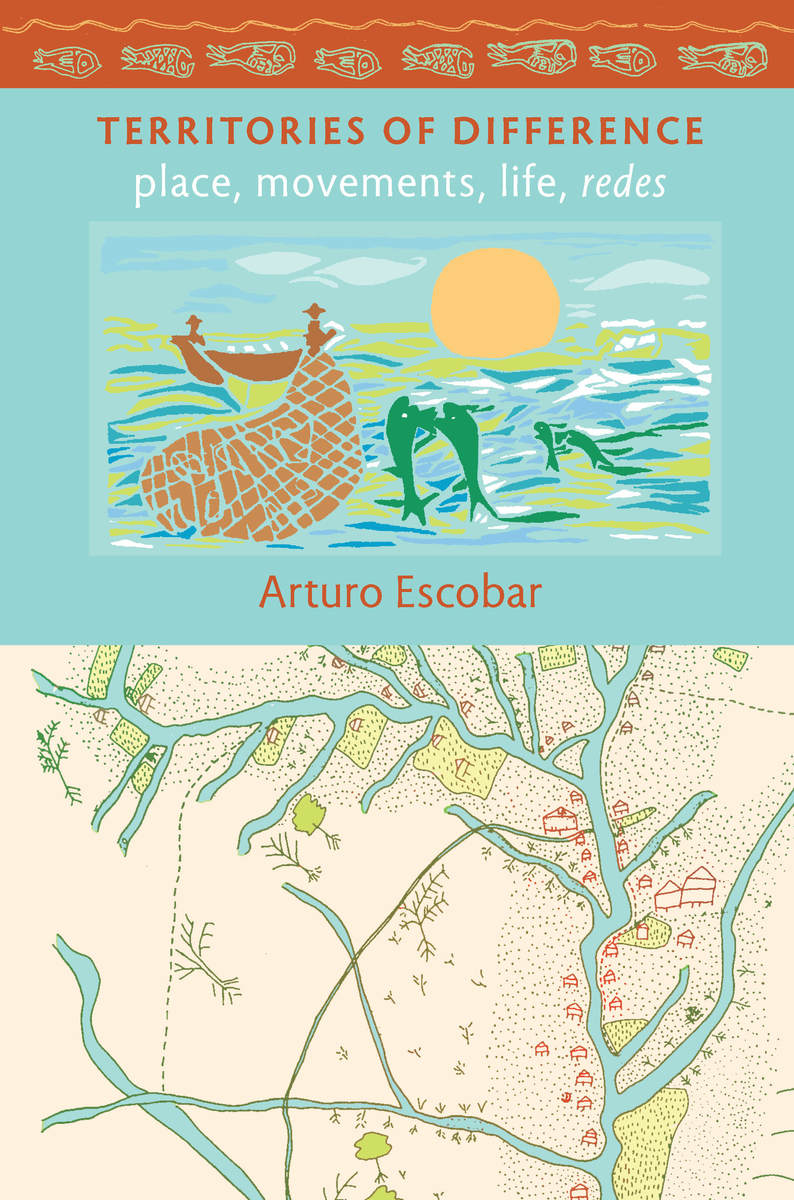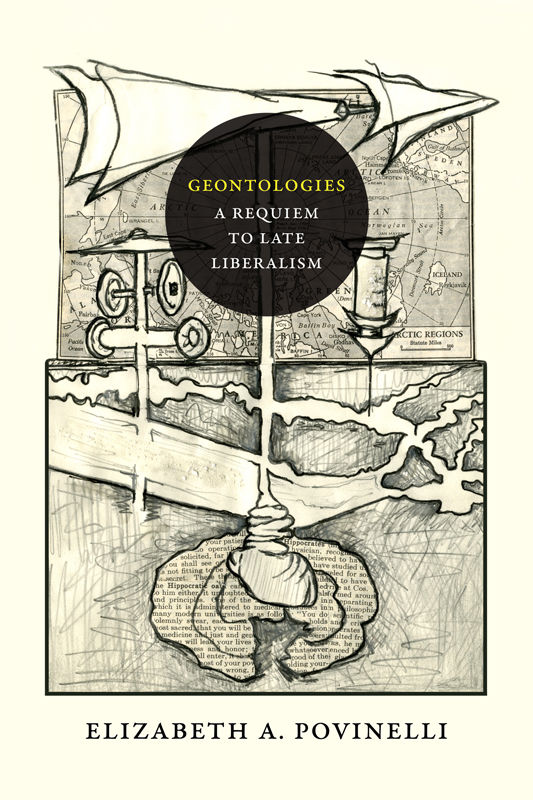Arturo Escobar: Territories of Difference: Place, Movements, Life, Redes (2008)
Filed under book | Tags: · anthropology, assemblage, biodiversity, black people, complexity theory, decoloniality, epistemology, ethnography, governance, indigenous peoples, modernity, nature, politics, self-organization, social movements, state, territory

“In Territories of Difference, Arturo Escobar, author of the widely debated book Encountering Development, analyzes the politics of difference enacted by specific place-based ethnic and environmental movements in the context of neoliberal globalization. His analysis is based on his many years of engagement with a group of Afro-Colombian activists of Colombia’s Pacific rainforest region, the Proceso de Comunidades Negras (PCN). Escobar offers a detailed ethnographic account of PCN’s visions, strategies, and practices, and he chronicles and analyzes the movement’s struggles for autonomy, territory, justice, and cultural recognition. Yet he also does much more. Consistently emphasizing the value of local activist knowledge for both understanding and social action and drawing on multiple strands of critical scholarship, Escobar proposes new ways for scholars and activists to examine and apprehend the momentous, complex processes engulfing regions such as the Colombian Pacific today.
Escobar illuminates many interrelated dynamics, including the Colombian government’s policies of development and pluralism that created conditions for the emergence of black and indigenous social movements and those movements’ efforts to steer the region in particular directions. He examines attempts by capitalists to appropriate the rainforest and extract resources, by developers to set the region on the path of modernist progress, and by biologists and others to defend this incredibly rich biodiversity “hot-spot” from the most predatory activities of capitalists and developers. He also looks at the attempts of academics, activists, and intellectuals to understand all of these complicated processes. Territories of Difference is Escobar’s effort to think with Afro-Colombian intellectual-activists who aim to move beyond the limits of Eurocentric paradigms as they confront the ravages of neoliberal globalization and seek to defend their place-based cultures and territories.”
Publisher Duke University Press, 2008
New Ecologies for the Twenty-first Century series, 1
ISBN 9780822343271, 0822343274
xvi+435 pages
Reviews: Laura Fano Morrissey (Development, 2009), Christopher L. Chiappari (Latin American Politics & Society, 2010), Pierre Hamel (American Journal of Sociology, 2010), Lilly U. Nguyen (Interactions, 2010), Rodrigo A. Lima de Medeiros & Guilherme F. W. Radomsky (Sociedade e Estado, 2010, BR-PT), Manuel J. Prieto (Revista de geografía Norte Grande, 2010, ES), Jeffrey S. Juris (American Anthropologist, 2011), Cornelia Butler Flora (J Agric Environ Ethics, 2011), Claudia Steiner (Americas, 2011), Paul Routledge, Juanita Sundberg, Marcus Power, & Arturo Escobar (Progress in Human Geography, 2012).
PDF (5 MB)
Comment (0)Matthew Plummer-Fernandez: The Art of Bots: A Practice-based Study of the Multiplicity, Entanglements and Figuration of Sociocomputational Assemblages (2018)
Filed under thesis | Tags: · algorithm, art, assemblage, bots, design, software, software art

“This thesis examines and analyses an emerging art practice known as artbots. Artbots are internet-based software applications that are imbued with character and configured to engage and entertain online audiences. This form of practice, and the community of practice leading it, was found to be underrepresented and misunderstood. I argue that this artform is original and warrants a more thorough understanding. This thesis develops a conceptual framework for understanding artbots that focuses on and enables questioning around pertinent aspects of the practice.
A wide range of literature was reviewed to provide theoretical underpinnings towards this framework, including literature on algorithm studies, science and technology studies, and software architecture. The devised framework examines artbot case studies through the notions of multiplicity, entanglement, and figuration, having understood artbots as heterogenous sociocomputational assemblages comprised of software components and human intraactivity.
The research followed a varied methodology that encompassed participant observation and my own practice-based experiments in producing artbots. The study resulted in several original works. In addition, a showcase titled Art of Bots brought together key proponents and artbots, further providing material that is analysed in this thesis. The study helped identify and discuss artbots with attention to how they utilise modular software components in novel arrangements, how normative human and nonhuman relations of interaction are being eschewed in favour of entangled interrelations, and how artbots challenge common narratives dictating technological constructs by inventing unique characters and figurations.”
Doctoral thesis
Publisher Goldsmiths, University of London, 2018
Creative Commons BY-NC-ND License
218 pages
PDF, PDF (10 MB)
ZIP (Supplemental material, 20 GB)
Elizabeth A. Povinelli: Geontologies: A Requiem to Late Liberalism (2016)
Filed under book | Tags: · anthropocene, assemblage, being, biopolitics, capital, difference, ethnology, geology, geontopower, governance, indigenous peoples, liberalism, life, ontology, power

“In Geontologies Elizabeth A. Povinelli continues her project of mapping the current conditions of late liberalism by offering a bold retheorization of power. Finding Foucauldian biopolitics unable to adequately reveal contemporary mechanisms of power and governance, Povinelli describes a mode of power she calls geontopower, which operates through the regulation of the distinction between Life and Nonlife and the figures of the Desert, the Animist, and the Virus. Geontologies examines this formation of power from the perspective of Indigenous Australian maneuvers against the settler state. And it probes how our contemporary critical languages—anthropogenic climate change, plasticity, new materialism, antinormativity—often unwittingly transform their struggles against geontopower into a deeper entwinement within it. A woman who became a river, a snakelike entity who spawns the fog, plesiosaurus fossils and vast networks of rock weirs: in asking how these different forms of existence refuse incorporation into the vocabularies of Western theory Povinelli provides a revelatory new way to understand a form of power long self-evident in certain regimes of settler late liberalism but now becoming visible much further beyond.”
Publisher Duke University Press, 2016
ISBN 9780822362111, 0822362112
xii+218 pages
Interview with author: Mathew Coleman and Kathryn Yusoff (Theory, Culture & Society, 2017).
Reviews: Shela Sheikh (Avery Review, 2017), Robin Wright (Society+Space, 2017), Eve Vincent (Australian Aboriginal Studies, 2017), Timothy Neale (Australian Journal of Anthropology, 2017), Andrea Muehlebach (Anthropological Quarterly, 2018), Jean-Thomas Tremblay (Critical Inquiry, 2018), Elizabeth R Johnson, Garnet Kindervater, Zoe Todd, Kathryn Yusoff, Keith Woodward (with author’s response, EPC: Politics and Space, 2019).
Comment (0)
